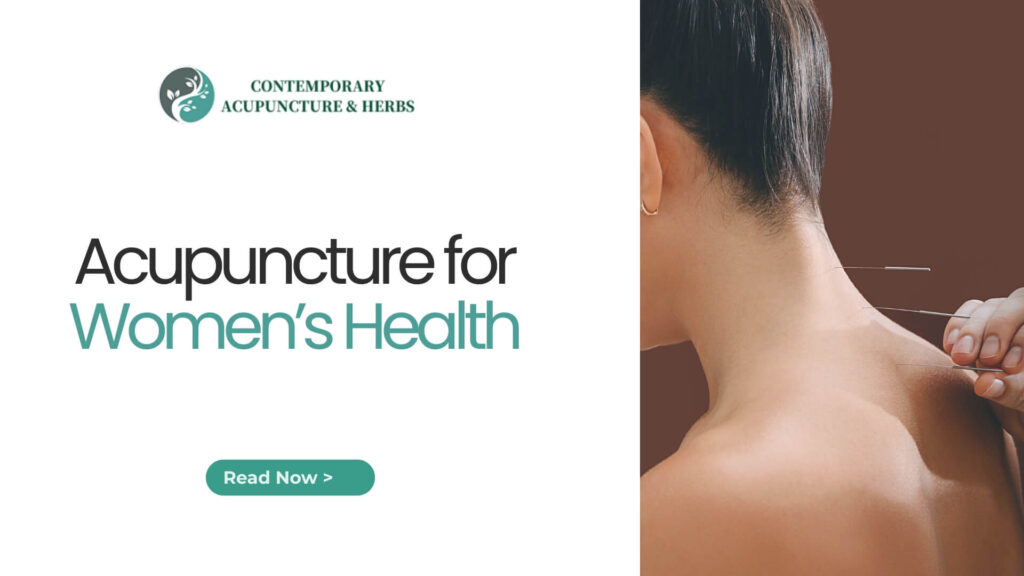At our clinic, we meet many women who are searching for gentle, effective ways to support their health through life’s different stages. From the first signs of a menstrual cycle to the transitions of pregnancy and menopause, each phase brings unique needs that deserve thoughtful care.
We believe acupuncture offers a safe, natural approach to restoring balance and easing the challenges that can come with hormonal changes, fertility, or everyday stress. With each treatment, our goal is to help the body find its own rhythm again, so that pain softens, energy returns, and the mind feels more at peace.
In this article, we’ll share how acupuncture can benefit women’s health in meaningful, evidence-based ways. Together, we’ll look at how it supports menstrual cycles, fertility, pregnancy, and beyond, and what you can expect if you decide to explore this path of care with us.
Ready to Take the Next Step Toward Balance?
Every woman’s health journey is unique, and we’re here to support yours with care that honors your body’s natural rhythms. Whether you’re seeking relief from painful cycles, preparing for pregnancy, or looking for support during menopause, acupuncture can provide a gentle, restorative path forward.
How Acupuncture Works in Women’s Health
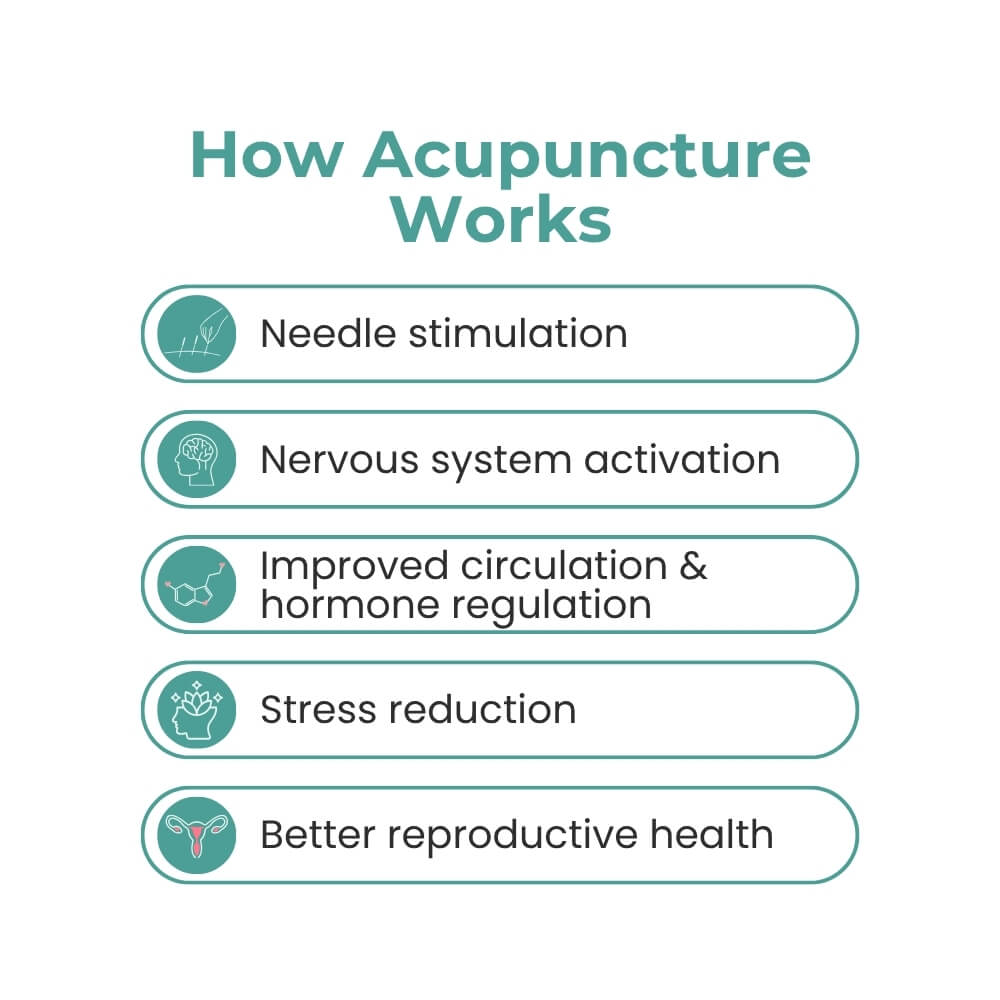
Acupuncture supports women’s health by working with the body’s own healing systems. When fine needles are placed at specific points, they send signals through the nervous system, prompting the brain and organs to communicate more effectively.
This gentle stimulation encourages circulation, eases muscle tension, and helps restore balance across the body.
For women, these effects are especially meaningful. Acupuncture can:
- Improve blood flow to the uterus and ovaries, creating a healthier environment for menstrual cycles and fertility.
- Support hormone regulation by influencing the hypothalamus, pituitary, and ovarian connection—the key pathway that governs reproductive hormones.
- Reduce stress hormones such as cortisol and prolactin, which can interfere with regular cycles and make conception more challenging.
Because every woman’s body is different, treatment plans are typically tailored to individual needs.
Sessions may be timed with different phases of the menstrual cycle or focused on specific concerns such as pain, mood changes, or sleep quality.
This personalized approach allows acupuncture to address both immediate symptoms and longer-term hormonal balance.
Menstrual Health Benefits
Many women come to acupuncture hoping for relief from common period concerns such as cramps, irregular cycles, and the emotional ups and downs that can happen each month.
Here’s how treatment can help.
Relief from Painful Periods
Period cramps happen when the muscles of the uterus tighten too strongly, cutting off blood flow and causing pain.
Acupuncture encourages better circulation in the lower abdomen and helps those muscles relax. Research shows that this improved blood flow is one reason many women report less pain after treatments.
Regulation of Irregular Cycles
When cycles are unpredictable, it often points to hormonal imbalances. Acupuncture helps the brain and ovaries “talk” to each other more clearly, which can guide the body back toward regular ovulation.
For women with conditions like polycystic ovarian syndrome (PCOS), studies suggest acupuncture may support more consistent cycles and ovulation.
Support for PMS and Mood Symptoms
PMS isn’t just physical. It often comes with mood swings, fatigue, and poor sleep. Acupuncture works on the nervous system to calm stress responses and lower the hormones that can make PMS feel worse.
Some studies show that acupuncture can help bring stress hormones like cortisol into better balance, which may explain why women often feel more relaxed before their periods.
Acupuncture for Fertility Support
For women who are trying to conceive, acupuncture can be a gentle way to support the body’s natural fertility. It can be used on its own or alongside medical treatments like IVF.
Supporting Natural Fertility
One way acupuncture may help is by encouraging more regular ovulation: the process where the ovary releases a mature egg.
In conditions such as polycystic ovarian syndrome (PCOS), ovulation doesn’t always happen on schedule, making it harder to become pregnant.
Research suggests that acupuncture can improve the communication between the brain and the ovaries, which may help restore more predictable ovulation pattern
Acupuncture also improves blood flow to the uterus and ovaries, which can make the uterine lining healthier and more receptive to a fertilized egg. In simpler terms, it helps create a stronger foundation for implantation and pregnancy.
Working Alongside Fertility Treatments
Many women choose acupuncture while undergoing in vitro fertilization (IVF). Large studies have found that women who receive acupuncture during IVF sometimes have higher pregnancy rates compared to those who don’t.
This may be because acupuncture reduces stress levels at key moments in the IVF process. Stress hormones like cortisol can interfere with the reproductive system.
Acupuncture helps calm the nervous system, which can improve relaxation before and after embryo transfer.
A Personalized Fertility Plan
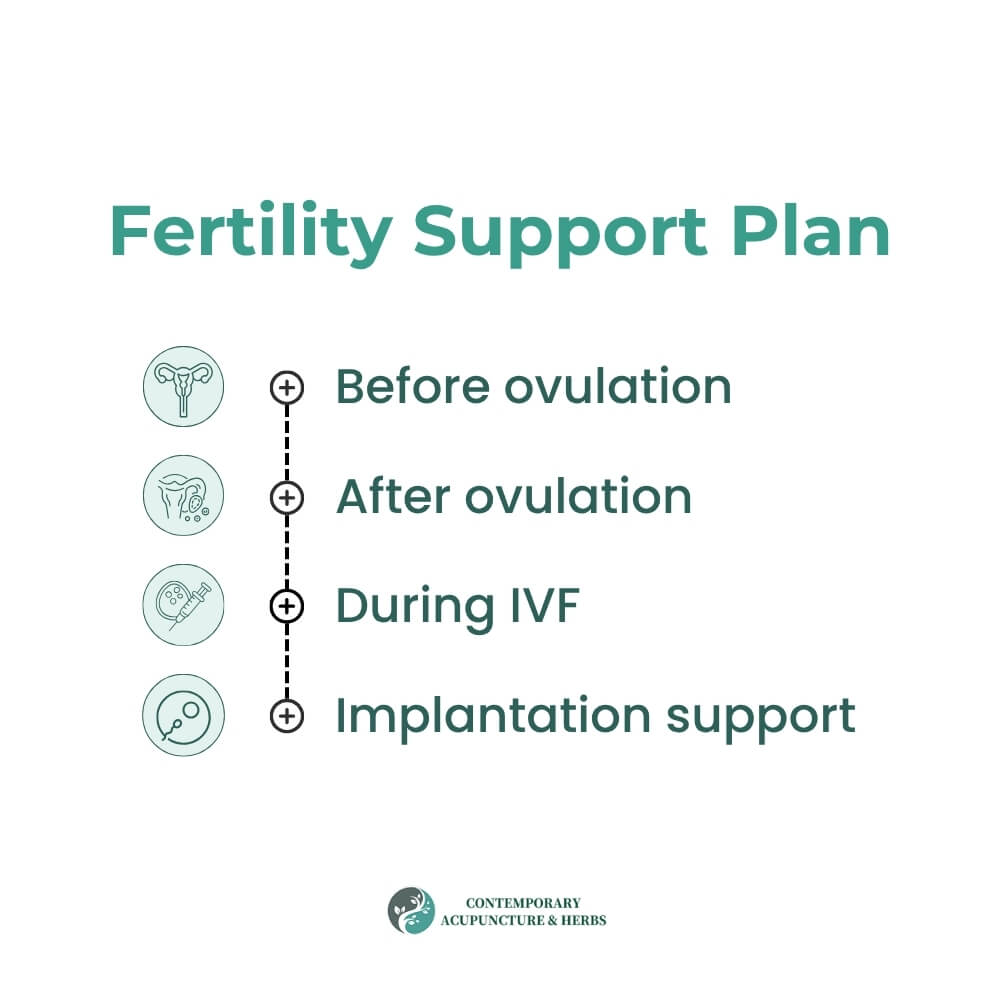
Fertility-focused acupuncture often follows a schedule that matches the menstrual cycle. For example:
- Before ovulation: treatments may aim to support egg development.
- After ovulation: treatments may help prepare the uterine lining for implantation.
- During IVF cycles: acupuncture is often scheduled around procedures such as egg retrieval and embryo transfer.
By working with the body’s natural timing, acupuncture supports both physical readiness and emotional well-being during the fertility journey.
Pregnancy-Related Benefits
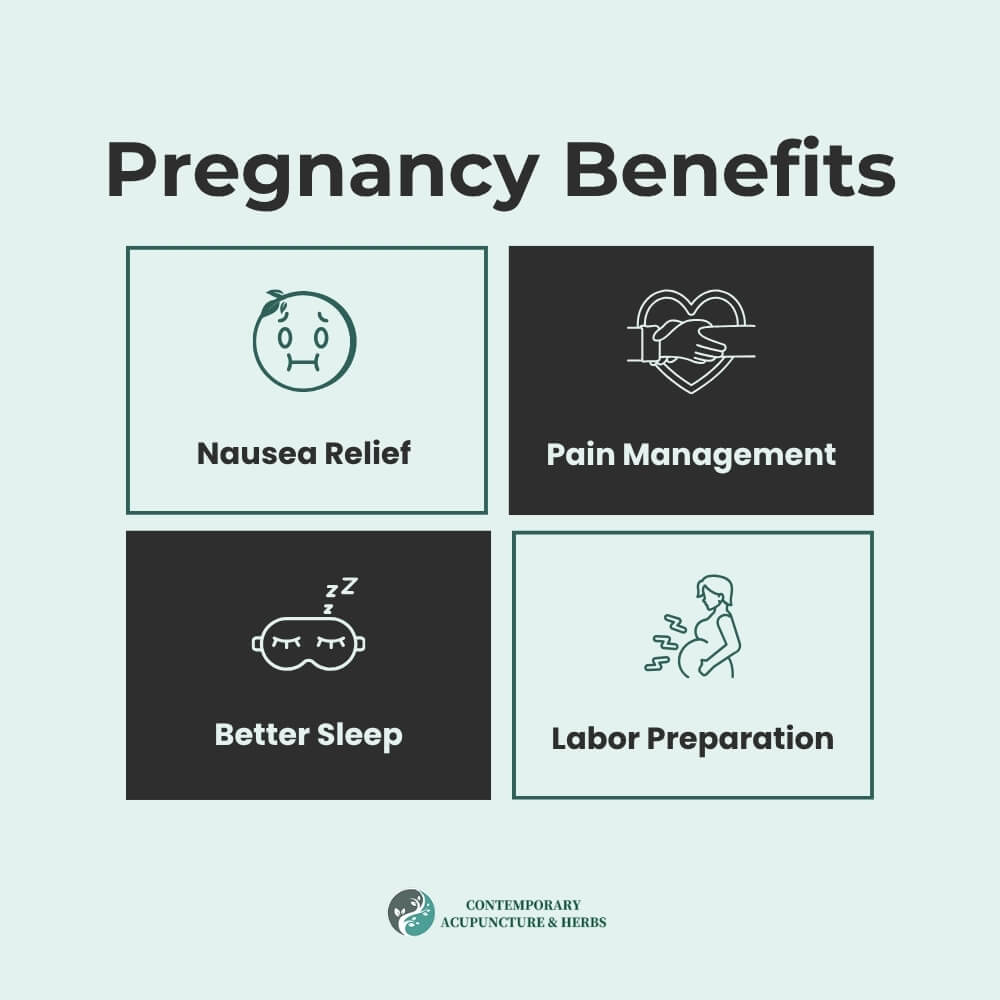
Pregnancy is a time of great change, and while it brings excitement, it can also come with discomforts. Acupuncture offers safe, drug-free support for many of the common challenges women face during pregnancy.
Relief from Nausea and Morning Sickness
Morning sickness—characterized by nausea and sometimes vomiting—is especially common in the first trimester. Studies show that acupuncture can help reduce the frequency and severity of nausea during pregnancy.
This works by calming the digestive system and regulating signals between the brain and stomach, giving many women much-needed relief.
Managing Pain During Pregnancy
Back pain, pelvic discomfort, and sciatica often appear as the body adapts to carrying extra weight. Because strong medications aren’t always recommended in pregnancy, acupuncture provides a natural option for pain management.
By improving circulation and releasing endorphins (the body’s natural pain-relieving chemicals), acupuncture helps reduce discomfort without the use of strong medications.
Supporting Sleep and Energy
Hormonal changes, physical strain, and stress can make restful sleep harder to achieve during pregnancy. Acupuncture has been shown to calm the nervous system and support better sleep quality, which also helps restore daytime energy levels.
Preparing for Labor
In the later stages of pregnancy, some women use acupuncture to help the body prepare for labor. Treatments at this time may focus on relaxing the pelvis, easing tension, and supporting the body’s natural readiness for childbirth.
While acupuncture is sometimes used to encourage labor when a woman is past her due date, this should always be done under the guidance of both an acupuncturist and the woman’s medical provider.
Safety Considerations
When performed by a licensed practitioner, acupuncture is considered safe during pregnancy.
The needles are sterile and placed with care, and specific points that may stimulate early contractions are avoided until the right stage of pregnancy.
Many women find sessions to be not only helpful, but also deeply relaxing during this important stage of life.
Hormonal Health and Menopause
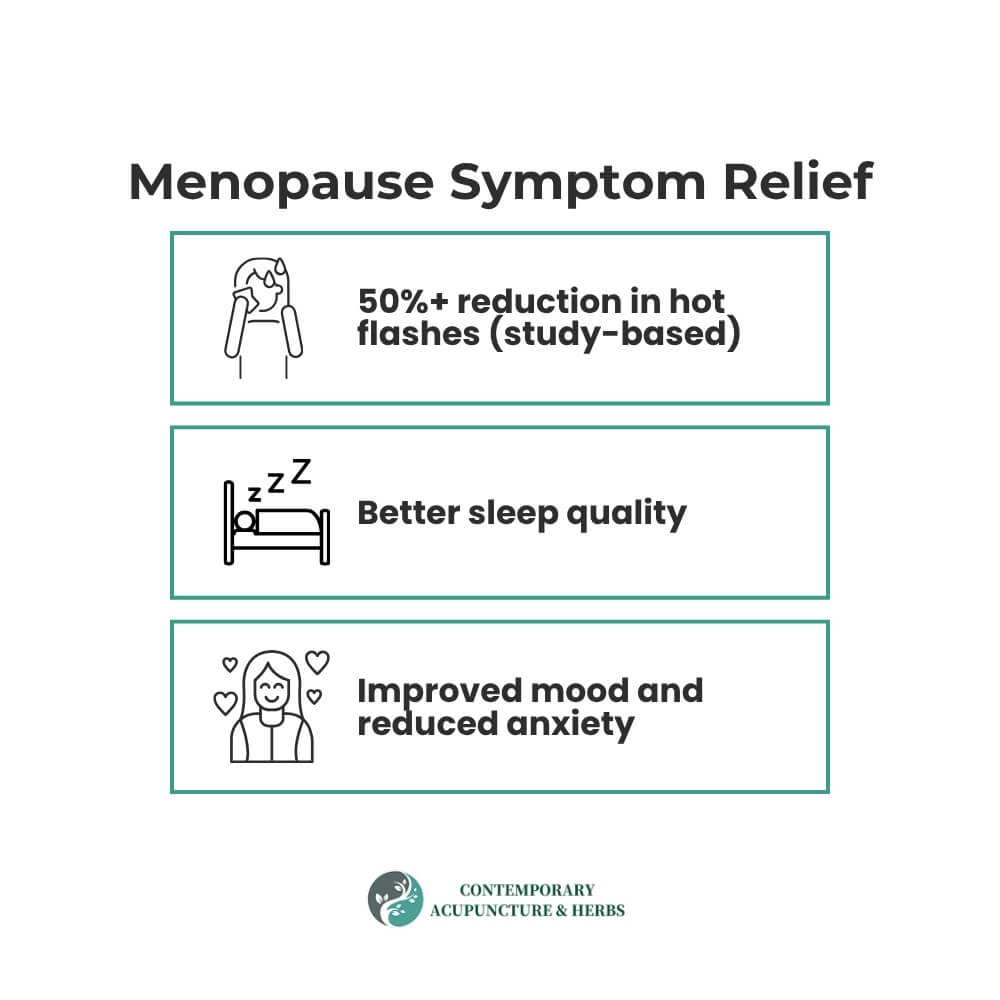
Hormones guide so many aspects of a woman’s health, from monthly cycles to mood, sleep, and metabolism.
When hormones shift, especially during perimenopause (the years leading up to menopause) and menopause (when menstrual periods end), many women experience symptoms that can affect daily life. Acupuncture offers a safe, natural option to help manage these changes.
Easing Hot Flashes and Night Sweats
Hot flashes and night sweats are among the most common symptoms of menopause. Acupuncture has been shown in clinical trials to reduce both their frequency and intensity.
Researchers believe this happens because acupuncture influences the body’s temperature-regulation system and helps balance hormone fluctuations.
Supporting Mood and Emotional Balance
It’s not just physical symptoms that change during menopause. Emotional shifts like irritability, low energy, or poor sleep can also arise.
Acupuncture stimulates the release of endorphins—the body’s natural “feel-good” chemicals—and helps calm the nervous system.
In addition to better sleep, these changes can help stabilize mood in a subtle yet real way, even if the biological mechanics aren’t always visible.
Improving Sleep Quality
Sleep can become elusive during menopause, with many women experiencing nightly awakenings, difficulty falling asleep, or restlessness.
Acupuncture sessions have been linked to improved management of menopausal insomnia by reducing nighttime awakenings and calming the stress response that keeps many women awake. This can make a meaningful difference in daytime energy and overall quality of life.
A Natural Complement to Other Care
Unlike hormone replacement therapy (HRT), which may not be right for every woman, acupuncture provides a drug-free option with few side effects.
It can also be used alongside medical treatments to give a more comprehensive approach to care. For many women, acupuncture offers a sense of balance and relief during a time of transition.
Stress, Mental Health, and Whole-Body Benefits
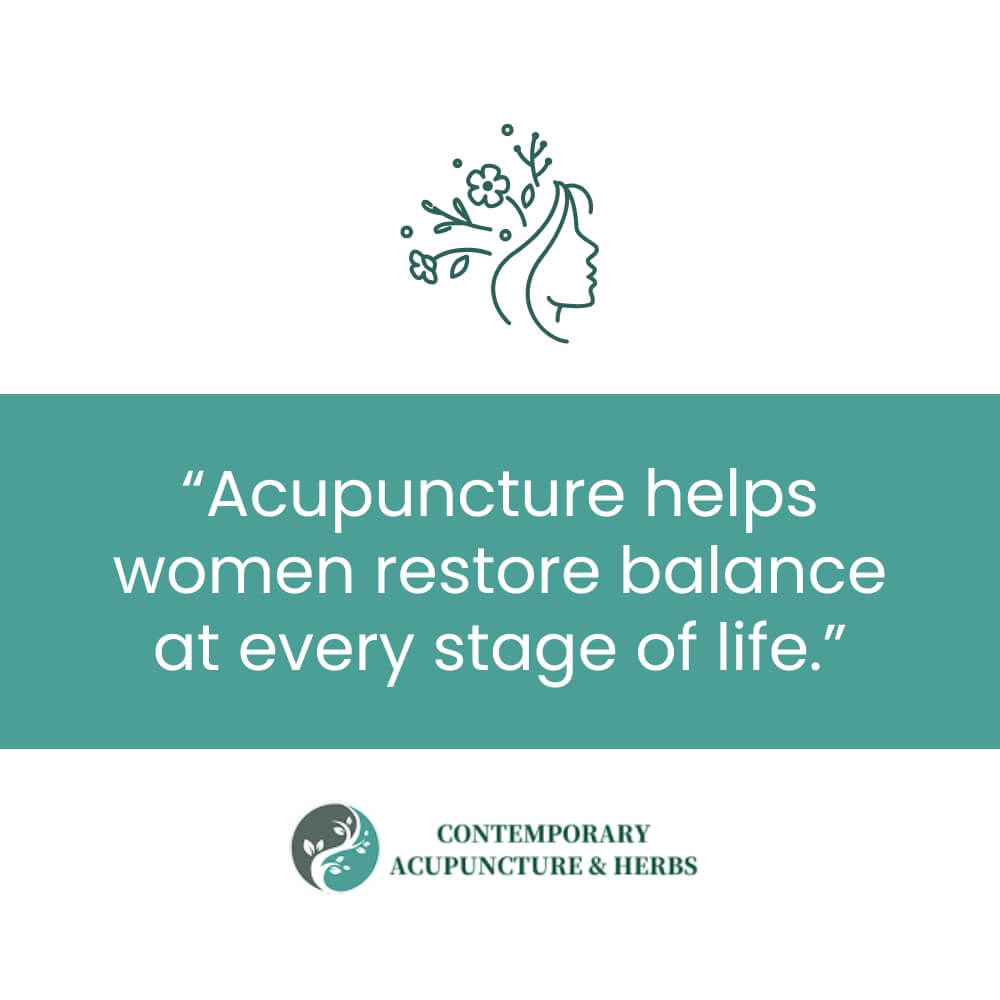
Stress has a direct impact on women’s health. Elevated levels of the stress hormone cortisol can interfere with sleep, disrupt menstrual cycles, and even affect fertility.
Acupuncture is well-documented for its ability to regulate the nervous system, which is why many women report a deep sense of relaxation after treatment.
Reducing Stress and Anxiety
Clinical studies have shown that acupuncture can lower cortisol levels—the hormone released during stress.
By helping the body shift out of a constant stress response, acupuncture promotes a calmer, more balanced state. This translates into reduced anxiety, greater focus, and improved capacity to manage daily demands.
Supporting Emotional Well-Being
Acupuncture also stimulates the release of endorphins, the body’s natural “feel-good” chemicals.
This neurochemical response contributes to improved mood stability, making acupuncture a supportive option for premenstrual mood swings, postpartum stress, or the emotional transitions of menopause.
Improving Sleep and Energy
When stress hormones remain elevated, restful sleep often suffers. Acupuncture helps regulate this imbalance, reducing nighttime disturbances and supporting deeper, restorative sleep.
As a result, many women experience steadier energy and greater resilience throughout the day.
Whole-Body Benefits
Because acupuncture influences multiple regulatory systems (circulatory, endocrine, and neurological), its benefits often extend beyond the primary concern.
Women seeking support for fertility or menopause, for example, frequently notice additional improvements such as fewer headaches, better digestion, or stronger immunity.
This integrative effect is one of the reasons acupuncture is valued as a holistic therapy.
Restore Balance, Support Your Health
Acupuncture helps regulate the systems that influence stress, hormones, sleep, and overall well-being. If you’re exploring options for menstrual health, fertility, pregnancy, or menopause support, our team is here to provide safe, individualized care.
Safety, Myths, and Common Questions
Acupuncture is often new to women exploring it for reproductive or hormonal health, so it’s natural to have questions. Here are some of the most common concerns.
Is Acupuncture Safe During Pregnancy?
Yes. When performed by a licensed practitioner, acupuncture is considered safe during pregnancy. Practitioners are trained to avoid specific points that could stimulate early contractions until the appropriate stage of pregnancy. Sessions use sterile, single-use needles and are tailored to each woman’s needs.
Does Acupuncture Hurt?
Acupuncture needles are extremely thin, about the width of a strand of hair. Most women describe the sensation as minimal, ranging from a light pinch to a brief tingling or heaviness that fades quickly. Many patients find sessions relaxing enough to fall asleep during treatment.
For those who prefer a needle-free acupuncture option, we also offer AcuWave Therapy. This advanced technology delivers gentle microcurrents through the skin to stimulate acupuncture points without the use of needles, making it an excellent alternative for anyone hesitant about traditional acupuncture.
How Often Are Treatments Needed?
Frequency depends on the concern being addressed. For menstrual or fertility support, sessions are often scheduled weekly or in alignment with different phases of the menstrual cycle.
For pregnancy or menopause, treatments may be adjusted based on symptom patterns. Your practitioner will outline a plan that matches your health goals.
Can Acupuncture Be Combined With Medication or Other Therapies?
Yes. Acupuncture is frequently used alongside conventional treatments such as IVF, hormone therapy, or pain management.
Research shows it can enhance outcomes by reducing stress, improving circulation, and supporting the body’s overall balance. Always let your practitioner know about any medications or treatments you are currently receiving so care can be fully coordinated.
Common Myths
- “Acupuncture is only for pain.”
While acupuncture is well-known for relieving pain, it also influences hormonal, neurological, and immune pathways that affect women’s health more broadly. - “It’s not evidence-based.”
A growing body of clinical research supports acupuncture’s role in fertility, pregnancy, menopause, and stress regulation. Many hospitals and fertility clinics now integrate acupuncture into patient care. - “Results are immediate.”
Some women notice improvement right away, but most benefits build gradually over a series of treatments as the body adjusts and finds balance.
What to Expect: A Woman’s First Acupuncture Session
For women considering acupuncture, knowing what happens in a session can help ease any uncertainty. While each experience is unique, there are some common steps you can expect.
Initial Consultation
Your first visit usually begins with a detailed health intake. The practitioner will ask about your medical history, menstrual cycles, sleep, digestion, stress levels, and specific concerns such as fertility, pregnancy, or menopausal symptoms. This helps create a treatment plan tailored to your individual needs.
Treatment Process
During treatment, very fine, sterile needles are placed at carefully selected points on the body. These points are chosen based on your health goals and current symptoms. Most women notice little to no discomfort; some describe a brief tingling or heaviness that fades quickly.
Relaxation Phase
Once the needles are in place, you’ll rest comfortably—often for 20 to 30 minutes. Many women find this part of the session deeply calming, with some even falling asleep. This period allows the body to respond and begin its natural balancing process.
Frequency and Timeline
The number of sessions needed depends on your goals. For menstrual health or fertility, weekly treatments may be recommended, particularly around different phases of the cycle.
For pregnancy support, sessions may be scheduled more or less frequently depending on symptoms. For menopause, the approach is often tailored to the severity of hot flashes, sleep disturbances, or mood changes.
Ongoing Care
Acupuncture is rarely a one-time treatment. Benefits usually build gradually as the body adjusts.
Practitioners often re-evaluate progress every few sessions and adapt the plan as needed, ensuring care remains personalized and effective.
Choose Expert Acupuncture Support for Women’s Wellness
Women’s health is constantly evolving, from the early years of menstrual cycles to the transitions of fertility, pregnancy, and menopause.
At every stage, the body deserves care that addresses not just symptoms, but the deeper systems that influence balance and well-being.
Acupuncture provides that level of support. By regulating hormones, improving circulation, calming stress, and restoring the body’s natural rhythms, it offers meaningful relief and long-term benefits.
Women who choose acupuncture often find improvements that go beyond their original concern—better sleep, steadier moods, and an overall sense of resilience.
At Contemporary Acupuncture, we specialize in providing this kind of care for women. Each treatment plan is designed with expertise, compassion, and a focus on your individual health goals.
Whether you’re seeking support with fertility, navigating pregnancy, or easing the changes of menopause, our team is here to help you feel balanced, supported, and well.
Talk to our specialists and take the next step toward expert acupuncture care designed for women’s wellness.

